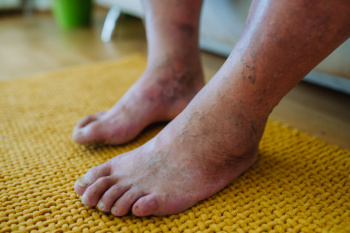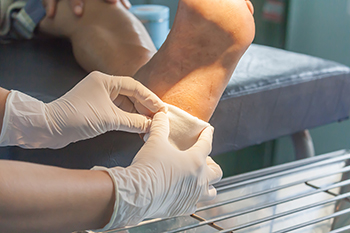 Monitoring foot health is important for people with diabetes, as they are at a higher risk of developing foot ulcers due to reduced blood flow and nerve sensitivity in their feet. Daily foot inspections to check for cuts, blisters, or any unusual changes is an important prevention measure. It is also important to maintain good foot hygiene and wear well-fitted shoes that minimize pressure points. Regularly moisturize the feet, except between the toes, to help prevent dry skin and cracks that could potentially become infected. A foot doctor, or podiatrist, plays a key role in this preventative care. Podiatrists can conduct thorough foot exams during routine check-ups, provide professional nail care, and offer advice on appropriate footwear. They can also custom-fit diabetic shoes and prescribe orthotics to ensure even weight distribution, which reduces the risk of skin breakdown. Additionally, a podiatrist can help manage any corns, calluses, or minor wounds before they develop into serious complications. If you have diabetes and at a higher risk for developing foot ulcers, it is suggested that you add a podiatrist to your care team.
Monitoring foot health is important for people with diabetes, as they are at a higher risk of developing foot ulcers due to reduced blood flow and nerve sensitivity in their feet. Daily foot inspections to check for cuts, blisters, or any unusual changes is an important prevention measure. It is also important to maintain good foot hygiene and wear well-fitted shoes that minimize pressure points. Regularly moisturize the feet, except between the toes, to help prevent dry skin and cracks that could potentially become infected. A foot doctor, or podiatrist, plays a key role in this preventative care. Podiatrists can conduct thorough foot exams during routine check-ups, provide professional nail care, and offer advice on appropriate footwear. They can also custom-fit diabetic shoes and prescribe orthotics to ensure even weight distribution, which reduces the risk of skin breakdown. Additionally, a podiatrist can help manage any corns, calluses, or minor wounds before they develop into serious complications. If you have diabetes and at a higher risk for developing foot ulcers, it is suggested that you add a podiatrist to your care team.
Diabetic foot care is important in preventing foot ailments such as ulcers. If you are suffering from diabetes or have any other concerns about your feet, contact George Tellam, DPM from Ankle & Foot Associates. Our doctor can provide the care you need to keep you pain-free and on your feet.
Diabetic Foot Care
Diabetes affects millions of people every year. The condition can damage blood vessels in many parts of the body, especially the feet. Because of this, taking care of your feet is essential if you have diabetes, and having a podiatrist help monitor your foot health is highly recommended.
The Importance of Caring for Your Feet
- Routinely inspect your feet for bruises or sores.
- Wear socks that fit your feet comfortably.
- Wear comfortable shoes that provide adequate support.
Patients with diabetes should have their doctor monitor their blood levels, as blood sugar levels play such a huge role in diabetic care. Monitoring these levels on a regular basis is highly advised.
It is always best to inform your healthcare professional of any concerns you may have regarding your feet, especially for diabetic patients. Early treatment and routine foot examinations are keys to maintaining proper health, especially because severe complications can arise if proper treatment is not applied.
If you have any questions please feel free to contact our offices located in Orange Park and Jacksonville Beach, FL . We offer the newest diagnostic and treatment technologies for all your foot and ankle needs.
 Prolonged standing or walking at work can put excessive strain on the feet and lower limbs and lead to foot pain. Various foot conditions can arise from this, including plantar fasciitis, heel pain, or arch pain. Improper footwear or not taking regular breaks can make these issues worse. Podiatrists, or foot doctors, can diagnose and treat foot pain caused by these occupational factors. They can provide personalized recommendations tailored to your specific needs, including advice on proper footwear and stretching exercises to alleviate discomfort. Podiatrists may also offer custom orthotic devices to provide support and cushioning, reducing the strain on your feet and improving overall comfort. People who work on their feet don’t have to suffer. It is possible to find relief from pain, work more efficiently, and preserve overall foot health. If you are experiencing foot pain due to work or standing all day, make an appointment with a podiatrist to discuss your options.
Prolonged standing or walking at work can put excessive strain on the feet and lower limbs and lead to foot pain. Various foot conditions can arise from this, including plantar fasciitis, heel pain, or arch pain. Improper footwear or not taking regular breaks can make these issues worse. Podiatrists, or foot doctors, can diagnose and treat foot pain caused by these occupational factors. They can provide personalized recommendations tailored to your specific needs, including advice on proper footwear and stretching exercises to alleviate discomfort. Podiatrists may also offer custom orthotic devices to provide support and cushioning, reducing the strain on your feet and improving overall comfort. People who work on their feet don’t have to suffer. It is possible to find relief from pain, work more efficiently, and preserve overall foot health. If you are experiencing foot pain due to work or standing all day, make an appointment with a podiatrist to discuss your options.
While working on the feet, it is important to take the proper care of them. For more information about working on your feet, contact George Tellam, DPM from Ankle & Foot Associates. Our doctor will treat your foot and ankle needs.
Working on Your Feet
Standing on your feet for long periods of time can cause stress and pain in your feet. Your whole body may experience change in terms of posture, back pain, bunions, callouses and or plantar warts. There are ways to avoid these conditions with proper foot care, smart choices and correct posture.
Positive Changes
Negative heeled shoe – Choosing this shoe type places the heel slightly lower than the ball of the foot. These are great for overall foot health. Find shoes that fit you correctly.
Go barefoot – Our feet were not designed to be enclosed for all hours of the day. Try to periodically expose your feet to air.
Eliminate Pain
Foot Exercises – Performing simple exercises, incorporating yoga and doing stretches are beneficial. This will allow increased blood flow to the area and muscles of the foot.
Achilles tendon – Stretching the foot out flat on the floor will relax the calf muscles and tendon. These exercises can be performed almost anywhere. Make sure you add these exercises to your daily regimen.
With a little bit of this information and knowing more about foot health, you will notice changes. Foot stretches and proper footwear will help with pain and prevent further issues.
If you have any questions please feel free to contact our offices located in Orange Park and Jacksonville Beach, FL . We offer the newest diagnostic and treatment technologies for all your foot and ankle needs.

Charcot foot, also known as Charcot neuroarthropathy, is a condition characterized by progressive weakening and degeneration of the bones and joints in the foot or ankle. It often affects individuals with peripheral neuropathy, such as those with diabetes. One significant complication of Charcot foot is the development of foot ulcers, which can result from pressure points and trauma due to the structural changes in the foot. These ulcers are particularly problematic as they can lead to serious infections and even amputation if left untreated. Unfortunately, Charcot foot and its associated ulcers may go undiagnosed or misdiagnosed initially due to symptoms resembling other foot conditions or neuropathic pain masking typical signs of inflammation. Podiatrists provide comprehensive care for Charcot foot including diagnosis, wound care, orthotic interventions, and patient education to prevent complications and improve the quality of life for affected individuals. If you feel a weakening in your feet or ankles, it is strongly suggested that you schedule an appointment with a podiatrist for a proper diagnosis and treatment. If you have Charcot foot, early intervention can thwart severe problems.
Wound care is an important part in dealing with diabetes. If you have diabetes and a foot wound or would like more information about wound care for diabetics, consult with George Tellam, DPM from Ankle & Foot Associates. Our doctor will assess your condition and provide you with quality foot and ankle treatment.
What Is Wound Care?
Wound care is the practice of taking proper care of a wound. This can range from the smallest to the largest of wounds. While everyone can benefit from proper wound care, it is much more important for diabetics. Diabetics often suffer from poor blood circulation which causes wounds to heal much slower than they would in a non-diabetic.
What Is the Importance of Wound Care?
While it may not seem apparent with small ulcers on the foot, for diabetics, any size ulcer can become infected. Diabetics often also suffer from neuropathy, or nerve loss. This means they might not even feel when they have an ulcer on their foot. If the wound becomes severely infected, amputation may be necessary. Therefore, it is of the upmost importance to properly care for any and all foot wounds.
How to Care for Wounds
The best way to care for foot wounds is to prevent them. For diabetics, this means daily inspections of the feet for any signs of abnormalities or ulcers. It is also recommended to see a podiatrist several times a year for a foot inspection. If you do have an ulcer, run the wound under water to clear dirt from the wound; then apply antibiotic ointment to the wound and cover with a bandage. Bandages should be changed daily and keeping pressure off the wound is smart. It is advised to see a podiatrist, who can keep an eye on it.
If you have any questions, please feel free to contact our offices located in Orange Park and Jacksonville Beach, FL . We offer the newest diagnostic and treatment technologies for all your foot care needs.

